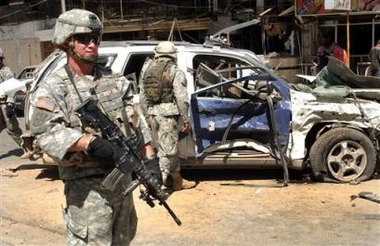A parked car packed with explosives hit a police patrol in the northern Iraqi
city of Mosul on Wednesday, killing at least five policemen and wounding 14,
including a senior officer, as violence continued unabated after one of the
bloodiest days in recent weeks.

U.S. soldiers attend the scene after a parked
car packed with explosives hit a police patrol in the northern city of
Mosul in Iraq, killing at least five policemen and wounding 14 others,
Wednesday, May 31, 2006. [AP] |
Iraqi Prime Minister Nouri al-Maliki, meanwhile, arrived in Basra in a bid to
stem escalating violence in the southern city. Sectarian tensions have been
worsening in the Shiite-dominated area, where Britain has about 8,000 soldiers
and other countries also have troops.
Al-Maliki, who was meeting with religious leaders, city officials and others,
said his trip was an effort to "heal the rift and find a solution for what
caused the latest events in Basra."
Elsewhere, Jamal Kadhim Hassoun al-Zamili, former governor of Diwaniyah city
south of Baghdad, was killed in a drive-by shooting late Tuesday that also
wounded two of his guards, police Capt. Ali Hussein said.
A bomb hidden in an air conditioner exploded in the mayor's office in
Muqdadiyah, about 60 miles north of Baghdad, killing the mayor, Sheik Allaywi
Farhan al-Dulaimi, a member of the Sunni Iraqi Islamic Party, and wounding three
of his guards, police said. Provincial Gov. Raad Rashid al-Mula Jawad imposed a
curfew on the city and deployed Iraqi army forces there.
Gunmen killed a Shiite muazzin, the man who calls for the five daily prayers,
as he was leaving his house to go to the Imam Ali Mosque in southwestern
Baghdad, Hussein said.
A roadside bomb also hit a joint U.S.-Iraqi patrol on the highway near the
Dora Refinery in southern Baghdad and the area was blocked off, police Capt.
Firas Geiti said. No casualties were immediately reported.
Another roadside bomb struck a Japanese-Australian patrol in northern
Samawah, on the Euphrates River about 230 miles southeast of Baghdad, damaging
the last vehicle of the convoy and slightly wounding an Iraqi man who was
selling ice, the man told AP Television News.
It wasn't clear if there were any casualties among the troops.
At least 17 bodies were found in separate locations in Baghdad, many
blindfolded and handcuffed, apparent victims of sectarian killings often blamed
on militias.
The new violence came a day after car bombs targeting Shiite areas tore
through a car dealership in southern
Iraq and a bustling outdoor market north of Baghdad as attacks nationwide
killed 54 people and wounded 120.
Iraqi officials also said Tuesday that a key terror suspect who allegedly
confessed to hundreds of beheadings was captured in a raid that netted
documents, cell phones and computers containing information on other wanted
terrorists and Islamic extremist groups.
An Emirati diplomat held hostage in Iraq after being abducted more than two
weeks ago was released without ransom, Emirati authorities said Tuesday. Naji
Rashid al-Nuaimi, 28, the first secretary at the United Arab Emirates Embassy,
was kidnapped by gunmen who shot and killed his Sudanese driver. It was unclear
who had kidnapped him.
Tuesday's worst bombing hit the market as Iraqis were doing their evening
shopping in the Shiite area of Husseiniyah, about 60 miles north of Baghdad. At
least 25 people were killed and 65 were wounded, Interior Ministry spokesman Lt.
Colonel Falah Al-Mohamedawi said.
That attack came hours after a car packed with explosives blew up at a
dealership in the largely Shiite city of Hillah, about 60 miles south of
Baghdad, killing at least 12 people and wounding 32, Capt. Muthana Khalid said.
A bomb hidden in a plastic bag also detonated outside a bakery in Baghdad,
killing at least nine people and injuring 10, police Lt. Col. Falah
al-Mohammedawi said.
Before Tuesday's violence, at least 4,066 Iraqis had been killed in
war-related violence so far in 2006 and at least 4,469 wounded based on
Associated Press reports, which may not be complete because the reporting
process does not cover the entire country.
During May, at least 871 Iraqis have been killed, surpassing the 801 killed
in April. The deadliest month this year for Iraqis has been March, with 1,038
killed and 1,155 wounded.
Al-Maliki, meanwhile, failed again Tuesday to persuade Iraq's ethnic,
sectarian and secular factions to agree on new defense and interior ministers,
leaving the key security posts vacant more than a week after his national unity
government took office.